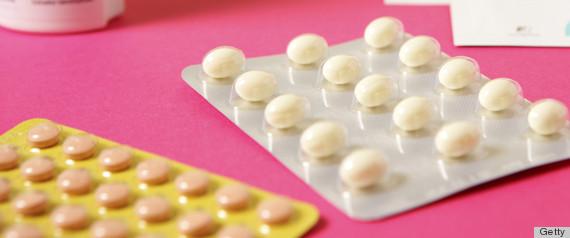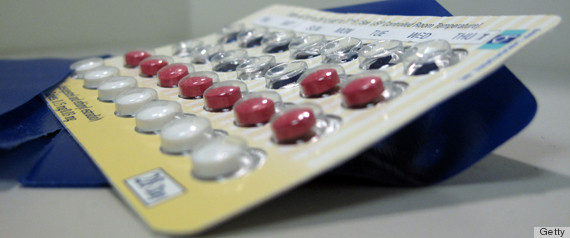
For the past 50 years, birth control pills have afforded women the freedom to take control of their bodies, plan childbirth... and alleviate their acne.
But is the pill a safe, effective method to clear up skin? We spoke to New York-based dermatologist Dr. Debra Jaliman and Meg Richichi, MS, LAc and an integrative women's health practitioner, to find out just what's going on in your body when you take the pill and how it affects your skin.
What Happens To Your Skin When You Go On the Pill
The reason a woman is placed on birth control to clear up acne is to reduce androgens, male sex hormones like testosterone, in her bloodstream. These androgens trigger an excess production of sebum oil that clogs pores and promotes breakouts. When you take birth control, like Yaz, Yasmin or Estrostep, you're ingesting estrogen and progestin, a synthetic form of progesterone. These hormones help lower the androgen levels and generally leave you with clear skin after three months.
Not all birth control pills have the same effect, though. Androgenic pills, those containing androgen-based progestin (rather than an anti-androgenic progestin), can actually promote acne. The progestins to look out for in these pills include: norgestrel, norethindrone acetate and levonorgestrel.

What Happens To Your Skin When You Go Off The Pill
This is where things tend to get tricky, depending on what your skin was like before you went on the pill. Dr. Jaliman assures us that going off the pill (i.e. stopping the intake of estrogen and progestin that lower those androgen levels) won't make you break out... unless you were already acne-prone before going on it. "For people with acne, every hormonal shift in their body can stimulate acne," she says, so those prone to zits can expect breakouts for three months after going off the pill until their hormone levels normalize again.

How To Avoid Acne While Transitioning Off The Pill
"A woman's hormones are kind of like a beautifully orchestrated symphony," Richichi says. "In the right balance, a woman’s skin will glow." She recommends nipping acne in the bud with a low-glycemic diet and cutting out refined carbohydrates, gluten and dairy -- all of which spike up your insulin levels and, in turn, your androgen levels (see why here). "To me, acne is a symptom and birth control is just a Band-Aid, because birth control pills don't address the underlying cause," she says.
In addition to changing patients' diets, Dr. Jaliman prescribes Spironolactone, a diuretic that blocks the male hormone receptors in the body to prevent the cells from absorbing testosterone, an acne-promoting androgen. "I prescribe it five to 10 times a day," she says. Dr. Jaliman also suggests topical anti-inflammatories, antibiotics and intralesional cortisone injections for those with cystic acne who are going off the pill. All of these, she says, are safer alternatives to Accutane. "You just have to get people through that three-month adjustment period," she says.
It's most important, however, to change your diet if you want to smooth over the process of going off the pill and address your acne head on, according to both Richichi and Dr. Jaliman. "When you don't address the cause, you go off the pill and your acne comes back with a vengeance," Richichi says, "If you're so concerned about getting off your medication in the first month, start changing your diet and wait four weeks before going off the pill."
The more you know...
